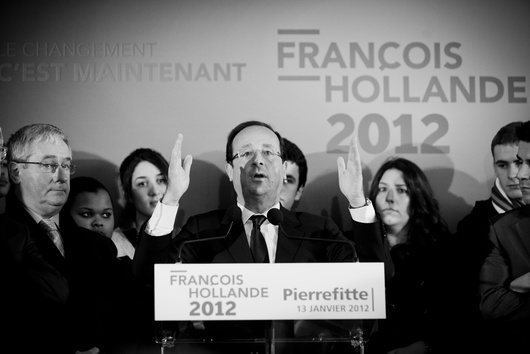
France is sleepwalking towards economic ruin
Published on
France has a large, wealthy economy. This is true today and it's been true for centuries. It's hard to imagine any other scenarios. But this complacency could see France sleepwalk to disaster. Clichés queue up to describe this downward spiral. 'Nothing lasts for ever'... 'the bigger they come the harder they fall'... and so forth
Near my home in Paris’ fifth arrondissement, there is a very quiet one-way road. Few cars pass along it, but even so there is an utterly unnecessary pedestrian crossing with traffic lights. You can imagine my surprise when the lights were supplemented by a traffic policeman enthusiastically waving his little stick at the occasional passing car, very self-important but completely superfluous. You would think such excessive decadence is the sign of a healthy economy and a government with more money than they know what to do with. Not quite.
Like a sloth on valium
France's national debt is spiralling out of control. The hexagon has snatched the ‘sick man of Europe’ mantle from troubled states such as Greece and Ireland. Whilst the rest of Europe has suffered the necessary pain and cut their deficits, the French government has faced the crisis with all the vigour and finesse of a sloth on valium. Europe’s second largest economy is sleepwalking towards disaster.
Four centuries after Louis XIV’s finance minister, Jean-Baptiste Colbert, laid down the philosophy, French governments are still re-bleating, ‘big state good, free market bad’ like well intentioned Orwellian sheep. France’s problems start with the huge state. The government spends 56.6% of GDP, more than any other government in the euro zone. In Germany it’s 44.7%, in Switzerland 34.1% and even the calamitous Greek government only spends 53.6% of GDP.
 Why is it a problem that the state spends so much? Surely state spending can stimulate growth? This is true to an extent, and moreover, France’s welfare system is rightly a source of tremendous pride. However, a huge state requires huge taxes, and in France taxes are strangling business. The government taxes business heavily, so business goes elsewhere, leaving France with a receding industrial sector. Between 2000 and 2013 salary costs rose 45% in France and only 24% in Germany. France’s competitiveness is poor, so naturally business hops across the border. France’s welfare system is supposed to improve quality of life, but really it’s having the opposite effect because the high taxes required to pay for it drive away industry and jobs. As a result unemployment is at a modern era high of 11.1% and 25% for under 24s. It seems the French state's love is suffocating.
Why is it a problem that the state spends so much? Surely state spending can stimulate growth? This is true to an extent, and moreover, France’s welfare system is rightly a source of tremendous pride. However, a huge state requires huge taxes, and in France taxes are strangling business. The government taxes business heavily, so business goes elsewhere, leaving France with a receding industrial sector. Between 2000 and 2013 salary costs rose 45% in France and only 24% in Germany. France’s competitiveness is poor, so naturally business hops across the border. France’s welfare system is supposed to improve quality of life, but really it’s having the opposite effect because the high taxes required to pay for it drive away industry and jobs. As a result unemployment is at a modern era high of 11.1% and 25% for under 24s. It seems the French state's love is suffocating.
Fighting François with cauliflowers and tractors
France’s national debt is almost two trillion euros. Piled in one dollar bills that would reach more than half way to the moon. In 2014 the government will throw away 46.7 billion euros on servicing that debt alone. Action is urgently needed, but François Hollande will not countenance making the necessary cuts to the budget. People resent Hollande’s inaction, and at 15%, his approval rating is the lowest a French president has ever had. But the French hate it even more when he actually does something, protesting his every move like bats out of hell. Hollande is stuck between a rock and a hard place. Instead of accepting this and taking tough decisions, he fumbles around in search of a non-existent pillow.
 He has tried to levy taxes on minority groups in the same cowardly manner David Cameron has cut welfare for minorities in the UK. Everyone knows the French love to protest, but nobody was prepared for quite such a furious reaction to Hollande’s tax increases. In October, he tried to levy a tax on heavy vehicles. Farmers in Brittany blocked roads with tractors and mountains of cauliflowers. They wore red hats reminscent of a 17th century revolt against Louis XIV and Colbert. Hollande backed down. He tried to levy a cruel and bizarre tax of 15.5% on savings schemes. He backed down after unsurprisingly angering everyone from successful businessmen to little old ladies who feared for their pension savings.
He has tried to levy taxes on minority groups in the same cowardly manner David Cameron has cut welfare for minorities in the UK. Everyone knows the French love to protest, but nobody was prepared for quite such a furious reaction to Hollande’s tax increases. In October, he tried to levy a tax on heavy vehicles. Farmers in Brittany blocked roads with tractors and mountains of cauliflowers. They wore red hats reminscent of a 17th century revolt against Louis XIV and Colbert. Hollande backed down. He tried to levy a cruel and bizarre tax of 15.5% on savings schemes. He backed down after unsurprisingly angering everyone from successful businessmen to little old ladies who feared for their pension savings.
The ever-present panaceas of beer and dancing
With government borrowing costing just 2.32% (ten year bond yield), France can continue this slow sleepwalk to disaster for quite sometime. This means the burden of French debt, although astronomical, is still sustainable because they can keep borrowing more to pay for it. However, on 8 November, the Standard and Poor debt rating agency downgraded French debt for the second time. This should set alarm bells ringing, not least of all because a debt downgrade is often a self-fulfilling prophesy. When a rating agency downgrades a government's debt, investors demand higher interest on the money they lend, borrowing costs rise and the government is more likely to default. The downgrade puts France at greater risk of default simply by saying France is at greater risk of default. On a side note, this is just one of many reasons debt rating agencies are at best far from useful, at worst downright dangerous.
Evidently things don't look good for the French economy, and by the same token, for Europe as a whole. Since there is nothing we as individuals can do to alleviate the doom and gloom around us, we have to fall back on our only guaranteed source of happiness- that internal fountain of buoyancy and merriment we call the human brain. Cast bond yields and deflation far from mind, forget you even read this and indulge in those ever-present panaceas - drinking beer and dancing.



